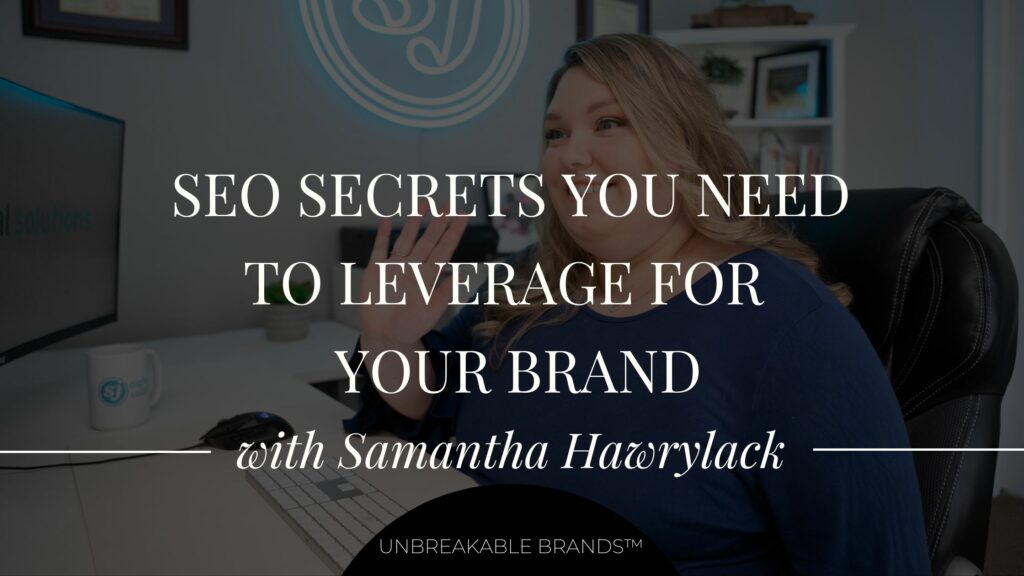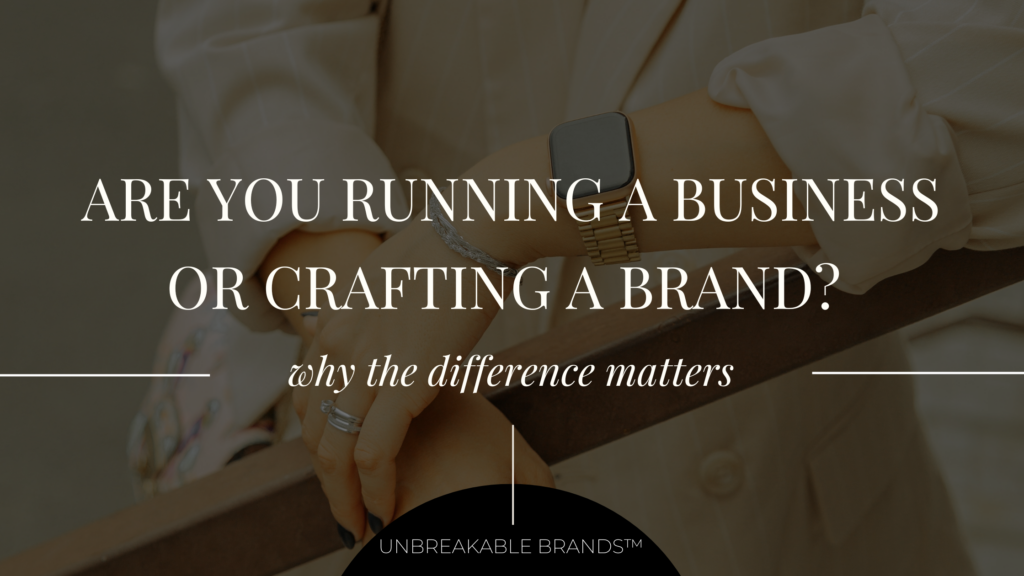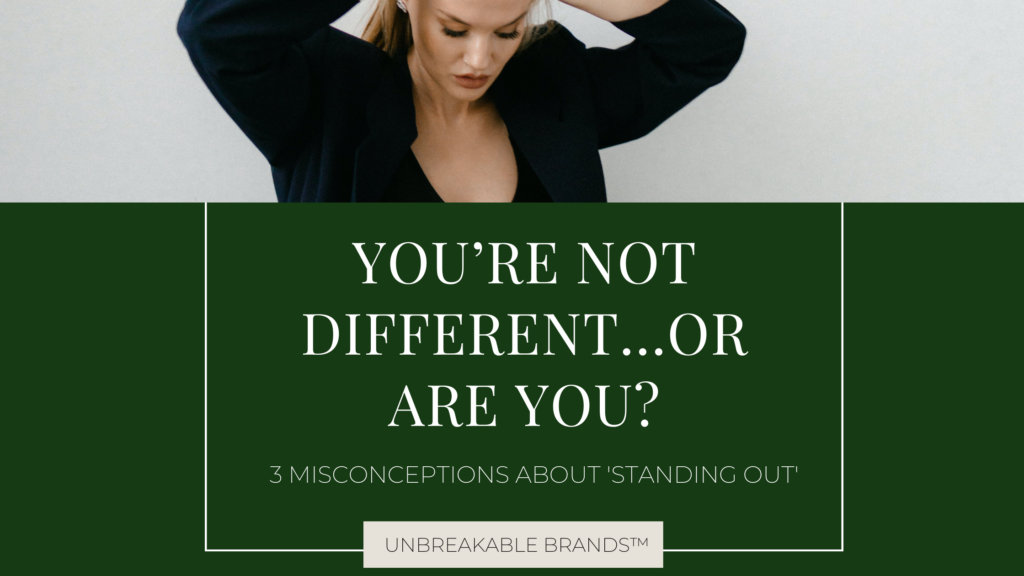Are you interested in learning about some SEO secrets so that you can better leverage your brand?
I am so thrilled to welcome Samantha Hawrylack to the podcast! We will be talking about the importance of SEO in brand building and how it’s a top contender for how you stand out and build visibility which leads to authority (plus how this is not your web designer’s responsibility, but they should be educated on implementing it).
Samantha Hawrylack is the co-founder and CEO of SJ Digital Solutions, a digital marketing agency, and How To FIRE, a financial education website. Her story began in corporate finance before transitioning to freelancer in 2019, followed by agency owner in 2021. She is an expert in SEO strategy and content marketing and has helped hundreds of business owners around the globe increase their traffic, leads, conversions, and revenue passively.
Keep reading to learn all about Samantha’s best SEO secrets in this interview!
SEO is not a overnight success at all. It’s very much a long game.
– Samantha Hawrylack, CEO of SJ Digital Solutions
Here’s what you can expect to hear in this episode:
- Samantha’s background and journey to running a major SEO agency
- What SEO is and isn’t
- The importance of investing in SEO services for your brand
- Samantha’s strategy for ranking on Google
- How to use SEO on podcasts and social media
- Samantha’s thoughts on AI
- SEO is the long haul for solid lead generation
- Things to look for when finding an SEO expert
Resources Mentioned In
This Episode
how did you get to where you are?
For me, it’s actually kind of funny – my husband and I started our financial independence blog back in 2018, and we knew nothing about SEO. We were seeing crickets on our blog for what felt like forever. But it started there, after a real passion for finance.
We really dove into everything and learned everything there was to know about SEO and content marketing. Then the following year, I was really miserable in my corporate job and really loved what we were doing with How To FIRE. So my initial thought was that I was going to quit corporate and work on How To FIRE full-time and start bringing in some clients to help other people do what we were doing on How To FIRE.
It all started there, and then kind of just spun into we were growing and bringing in more clients and really helping people make an impact in financial literacy. That brings us to today, where we have our agency going, and we also still have How To FIRE.
What is SEO? What is it not?
At the simplest level, SEO is really when you’re optimizing for when someone goes to Google and searches for a question they have, and a page comes up with a bunch of different websites.
The higher you are in those results, the better your SEO is for that search term or search phrase. There are a lot of different things that go into SEO. It’s really important to know that SEO is not your website; not every website has SEO.
It really comes down to how you’re optimizing every single page on your website, in terms of primary and secondary keywords, page titles, meta descriptions, even headings, URLs, and the actual content you’re writing is a really big one too. But even more than that, it goes further than just even what you have on your website because it includes off-page elements like backlinks that you’ve built from other websites and also your brand authority in your niche.
Why Invest in SEO as You Grow Your Brand?
When it really comes down to it, you’re building your brand, and you have a company. When you’re first starting out, you have your hands in so many different buckets. Now you’re the operations manager, you’re the VA, you’re the bookkeeper, social strategist… you do it all.
So when you have that much on your plate, it really isn’t realistic to learn a whole new different skill set, keep up with all the industry updates, best practices, and all of that because you don’t have the time, and it’s constantly evolving.
Sometimes you really just need that extra hand, where SEO is all that service provider does. They’re going to help you really get from where you are and grow your visibility of using SEO without you even really touching anything.
I would say, if you want to consider SEO, or you’ve been thinking about it, I would consider, what have you been doing with SEO lately? Have you been watching YouTube videos? Or downloading all the freebies? Or you’re not seeing all the traction, or the effort that you’re putting in isn’t producing an ROI for you?
I would say at that point, whether it’s one of those things or just not having the time to stick your hand in another bucket, that that’s when you should really consider investing in SEO Services.
Is it even possible to rank on Google anymore with so many people online running businesses?
It’s definitely a big deterrent that I hear. My answer is going to be both yes and no. I’ll explain why.
So if you’re trying to rank for really difficult search terms in your industry, established, well-known companies are all going to have content on them. It’s going to be really hard when you’re first starting out. You’ll have a slim chance of ranking for those terms because you’re going against the really established brands.
That’s when I say that, no, you’re not going to rank. But with my strategy, and the one that I take with all of my clients, is that you need to go after realistic keywords for your site size and your authority so you have a better chance at ranking. When you do that, it’s pretty common to rank.
The strategy that I use with all of my clients, and we’ve seen really great success, one of my financial coaching clients in a year actually went from 100 pageviews a month to over 17,000 just by making sure that we have realistic keywords. Even if they’re, you know, less search volume, when you consistently publish content over time, it really adds up.
Can you also apply social media and podcast SEO? What does that changing landscape look like?
When it comes down to podcasts, I actually see that it’s very common for these brands to put out their podcast, and they’re more focused on who can I get on the podcast and what we can talk about rather than doing the strategy ahead of time.
So many times, brands will rank their podcast for the guest’s name rather than a search term that’s actually going to bring their ideal client into their world.
What I recommend brands do is actually do keyword research ahead of time. You can base all of your topics around keywords, and you can still make it unique and share your voice and your character and all of that. But you can also be strategic about it.
So, you record that topic based on the keyword. Then when you publish your show notes, you should write a comprehensive article, you can hit two birds with one stone, so you write a comprehensive SEO-optimized article. Then you can also include your podcast transcript and audio because that adds the value and the unique expertise that Google really looks for right now.
As far as social media, I think that social media SEO is really not as straightforward as regular SEO like Google, where Google lays out its guidelines and has resource hubs about all kinds of different best practices. It’s a little bit more unclear.
But what I found, like with Instagram or Tiktok, is that every piece of content, whether it’s your feed or your videos, they clue the platform into what your post is actually about, so they can know who to push it out to.
Take The Brand Quiz To Unearth Your brand personality
Pop over to our brand and web design agency and take the free brand personality quiz to begin diving into your brand persona.
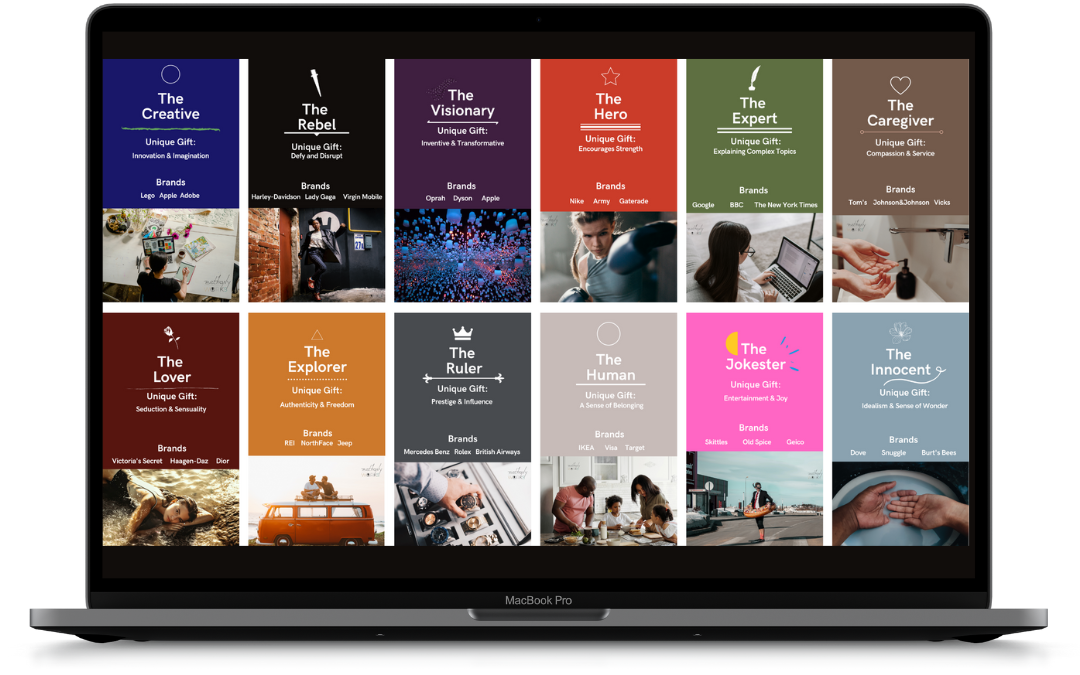
What are your thoughts on AI SEO tools? Is it something you love and are leaning into? Or do you think it’s going to disrupt the industry, And how are you prepping for that?
It’s not currently something that we are using regularly. I will use it to spark ideas for blog titles or meta descriptions, but it’s not something that I feel is developed enough to use for writing.
You really need that unique perspective and your writing and creativity and that human touch that I don’t believe AI is quite capable of yet, and from another perspective here, I don’t believe that we’ve been given enough guidance from Google yet to know if it’s actually okay to just pump out AI content and publish it to your blog. It’s not really something that I recommend to my clients or even myself for How To FIRE that we risk.
I know that the bigger brands out there who, like, let’s just say, the Nerd Wallet, so the finance industry, that they have such a high authority that it feels like everything they write is going to rank immediately. Brands like that can sometimes get away with just pumping out AI content.
But for the smaller brands who are still building, it’s very important to make sure that every aspect of your content, not only your SEO, but your content quality, is really top-notch and has that human touch to the content, best practice practices, the expertise in there, so Google can value your content over other brands.
I feel like SEO has been a long haul, and I’d love to hear your perspective about how long does it take to rank on Google for brands
It’s something I find that many people will give up on a little too quickly. Because SEO is not an overnight success at all, it’s very much a long game. We find that people who have their website optimized and they’re consistently putting out content weekly, at least. And they’re building backlinks and doing all the backend SEO stuff that it generally takes three to six months to see your first little rift of results.
It really does take time, unlike SEO and paid ads, where it kind of spikes immediately based on trends and all of that.
The great thing about SEO that I found is if you do it right, you’re really going to bring in qualified leads, not just any old leads; they’re going to be very aligned with what you’re putting out there.
when someone is ready to invest in an seo expert, what should they be asking, what should they be looking for?
I’m a big proponent of looking for somebody who has had success in your niche. So whether that be in the form of case studies or testimonials, I think that’s huge because every SEO can be very different from niche to niche.
Then I recommend being very transparent with whoever you’re speaking with, whatever SEO expert that may be, to let them know what you’ve done so far and where you want to go because the vision is very important for what strategy you put in place.
For the site that is more established and already has blog content, your strategy is going to be much different than for the brand that is just starting out and doesn’t have any blog content.
So just to give you an example, for a brand who’s just starting out, the first step may be optimizing the main pages on the website, such as the homepage and about page and pages like that.
Then the other more established brand, which already has blog content, we may be diving into the end analytics first, and really seeing what’s working and what’s not and optimizing all the blog content you have first, before then moving on to developing a keyword strategy and new content.
It’s also very important to understand like, what is the goal of SEO for you? Are you trying to drive traffic? So you can apply it on networks? And you just want a lot of traffic? Or do you want more qualified traffic, where you want them to convert into consultation calls, leads, your email list, things like that, because there’s different conversion tactics, and keyword strategies you can use in SEO for both of those different methods.
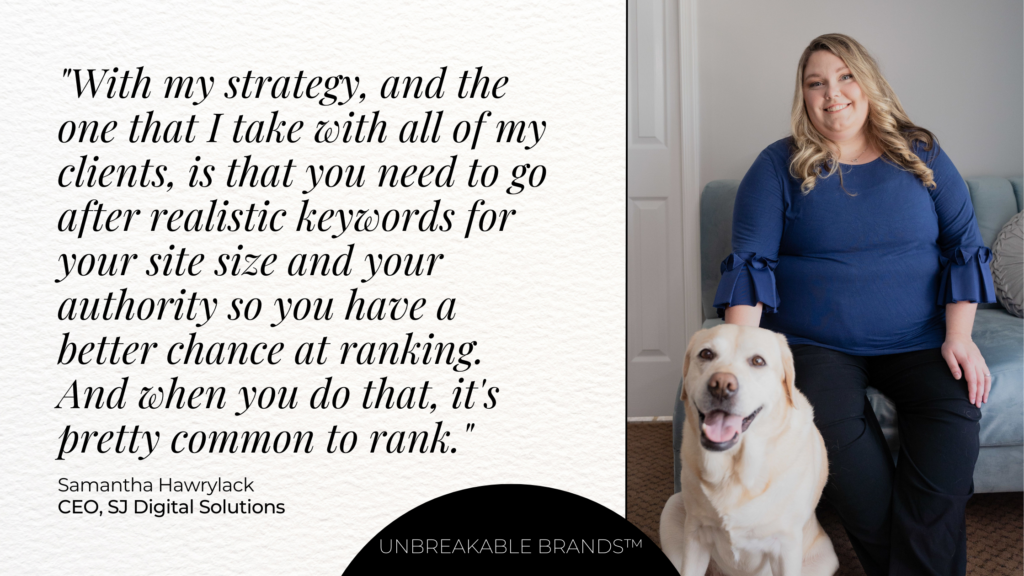
Samantha Hawrylack bio
Samantha Hawrylack is the co-founder and CEO of SJ Digital Solutions, a digital marketing agency, and How To FIRE, a financial education website. Samantha graduated from West Chester University of Pennsylvania with a Bachelors in Finance and a Master of Business Administration. Samantha went from full-time corporate finance employee at Vanguard to multi-six-figure digital marketing agency owner and finance blogger by age 24.
She is an expert in SEO strategy and content marketing and has helped hundreds of business owners around the globe increase their traffic, leads, conversions, and revenue passively. Samantha has been featured in Forbes, Yahoo! Finance, FOX Business, Debt.com, CNBC, GoBankingRates, MSN Money, NASDAQ, US News & World Report, and many more.
Reach out to Samantha on LinkedIn, Instagram, or her website.

